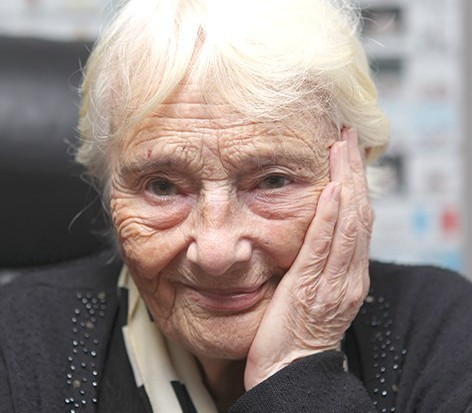Rounding out the week (and the semester) with a thread about Annie Fiorio-Steiner, the moudjahida (veteran of Algerian War of Independence) who died this week and whose life story has much to tell us about gender, race, memory and national liberation.  https://abs.twimg.com/emoji/v2/... draggable="false" alt="🇩🇿" title="Flagge von Algerien" aria-label="Emoji: Flagge von Algerien">
https://abs.twimg.com/emoji/v2/... draggable="false" alt="🇩🇿" title="Flagge von Algerien" aria-label="Emoji: Flagge von Algerien"> https://abs.twimg.com/emoji/v2/... draggable="false" alt="♀️" title="Weibliches Zeichen" aria-label="Emoji: Weibliches Zeichen">
https://abs.twimg.com/emoji/v2/... draggable="false" alt="♀️" title="Weibliches Zeichen" aria-label="Emoji: Weibliches Zeichen">
Born in 1928 to an Italian-origin father and a French mother, Annie had a middle-class childhood in Tipaza. Her father was a hospital director and spoke Arabic and apparently had a strong social conscience while her mother was deeply committed to her Catholic faith.
She chose to learn Arabic at school and then study law, a path that subverted conservative gender and colonial norms within the settler community. Once qualified she went on to work in social service centres set up by the anthropologist and hero of the resistance Germaine Tillon.
The poverty she witnessed there as well as her chaffing at the sclerotic culture of settler society made her an unlikely radical. Her enthusiasm when news broke of the beginning of the FLN insurrection was met with condescending amusement among her social milieu.
Yet Steiner would soon enter join the ranks of the FLN. Unlike many of the other European women in the nationalist movement, she had no background in the Communist Party of Algeria and was not from a radical milieu or married to a fellow radical.
She acted as a courier for the FLN and played an important role in brokering the alliance that would see the Communists subsumed into the organisation. Arrested in 1956, she was sent to the notorious Barberousse prison& #39;s women& #39;s wing with other FLN members.
Her prison experience became central to her sense of solidarity, shared identity and common struggle with Muslim Algerian women, both within the movement and in the general prison population. She was involved in resistance within the prisons and was subject to harsh punishment.
One of the most tragic (and specifically gendered) parts of Steiner& #39;s story relates to her loss of custody of her children after her release from prison. Her husband who was not involved in the movement took their 2 daughters Switzerland and she lost a court bid to get them back
She eventually travelled back to Algeria where she was welcomed and housed by her former prison comrades. The newly independent nation faced a shortage of highly educated workers and Steiner was soon hired into a position at the General Secretariat of the Government.
There she played a very important role in preparing and publishing the Journal Officiel, the expression of the new legal framework of the post-colonial state, working alongside important statesmen, including Presidents Ben Bella and Boumediene.
@VinceNatalya& #39;s fantastic book on women veterans details how figures like Steiner sought to insert their experiences of the war into the larger national narratives, minimising their personal motivations and stressing their part of the collective struggle, un seul héros le peuple
This doesn& #39;t mean she was not critical of elements of the management of the post-colonial state. Like her fellow veterans, she framed her critique of the state within the dominant historical narrative, arguing it represented a betrayal of the revolution.
In a 2011 interview with journalist Hafida Ameyar, she said the following: & #39;I didn& #39;t serve 5 years in prison and lose my childern to see Algeria pillaged like in the colonial times, so Mr. Mohamed could replace Mr. Pierre& #39; http://www.socialgerie.net/spip.php?article830">https://www.socialgerie.net/spip.php...
Her prediction that one day soon & #39;these greedy and unscrupulous predators will find themselves up against the young and the not so young& #39; has perhaps been born out by the mass protests of the Hirak, in which the moudjahidate have been present in person or as icons of revolution.
Steiner& #39;s life points to the problems of deterministic histories and underlines the importance of agency and the particularly gendered and racialised experiences of colonialism and anti-colonialism. It perhaps can open reflections on similar lives and experiences beyond Algeria
Still so powerful to hear talk about her experience, interrogating her own positionality, staking a claim to her place within the national narrative and showing the power of radical thinking and actions to effect change: https://www.youtube.com/watch?v=3rOD2qBYypA">https://www.youtube.com/watch...

 Read on Twitter
Read on Twitter https://abs.twimg.com/emoji/v2/... draggable="false" alt="♀️" title="Weibliches Zeichen" aria-label="Emoji: Weibliches Zeichen">" title="Rounding out the week (and the semester) with a thread about Annie Fiorio-Steiner, the moudjahida (veteran of Algerian War of Independence) who died this week and whose life story has much to tell us about gender, race, memory and national liberation. https://abs.twimg.com/emoji/v2/... draggable="false" alt="🇩🇿" title="Flagge von Algerien" aria-label="Emoji: Flagge von Algerien">https://abs.twimg.com/emoji/v2/... draggable="false" alt="♀️" title="Weibliches Zeichen" aria-label="Emoji: Weibliches Zeichen">">
https://abs.twimg.com/emoji/v2/... draggable="false" alt="♀️" title="Weibliches Zeichen" aria-label="Emoji: Weibliches Zeichen">" title="Rounding out the week (and the semester) with a thread about Annie Fiorio-Steiner, the moudjahida (veteran of Algerian War of Independence) who died this week and whose life story has much to tell us about gender, race, memory and national liberation. https://abs.twimg.com/emoji/v2/... draggable="false" alt="🇩🇿" title="Flagge von Algerien" aria-label="Emoji: Flagge von Algerien">https://abs.twimg.com/emoji/v2/... draggable="false" alt="♀️" title="Weibliches Zeichen" aria-label="Emoji: Weibliches Zeichen">">
 https://abs.twimg.com/emoji/v2/... draggable="false" alt="♀️" title="Weibliches Zeichen" aria-label="Emoji: Weibliches Zeichen">" title="Rounding out the week (and the semester) with a thread about Annie Fiorio-Steiner, the moudjahida (veteran of Algerian War of Independence) who died this week and whose life story has much to tell us about gender, race, memory and national liberation. https://abs.twimg.com/emoji/v2/... draggable="false" alt="🇩🇿" title="Flagge von Algerien" aria-label="Emoji: Flagge von Algerien">https://abs.twimg.com/emoji/v2/... draggable="false" alt="♀️" title="Weibliches Zeichen" aria-label="Emoji: Weibliches Zeichen">">
https://abs.twimg.com/emoji/v2/... draggable="false" alt="♀️" title="Weibliches Zeichen" aria-label="Emoji: Weibliches Zeichen">" title="Rounding out the week (and the semester) with a thread about Annie Fiorio-Steiner, the moudjahida (veteran of Algerian War of Independence) who died this week and whose life story has much to tell us about gender, race, memory and national liberation. https://abs.twimg.com/emoji/v2/... draggable="false" alt="🇩🇿" title="Flagge von Algerien" aria-label="Emoji: Flagge von Algerien">https://abs.twimg.com/emoji/v2/... draggable="false" alt="♀️" title="Weibliches Zeichen" aria-label="Emoji: Weibliches Zeichen">">


